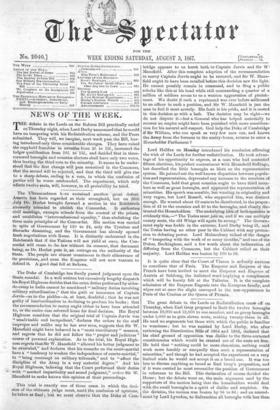The Duke of Cambridge has finally passed judgment upon the
Simla scandal. In a well written but excessively lengthy despatch his Royal Highness decides that the extra duties performed by aides- de-camp in India cannot be considered "military duties involving military subordination ;" that the guilt or innocence of Captain Jervis—as to the pickles—is, at least, doubtful ; that he was not guilty of insubordination in declining to produce his books ; that the recommendation to mercy ought either to have been attended to, or the entire ease referred home for final decision. His Royal Highness considers that the original trial of Captain Jervis was " unadvisable and inexpedient," declares the orders to the staff improper and unlike any he has ever seen, suggests that Sir W. Mansfield might have behaved in a "more conciliatory" manner, and regrets that he did not follow the "proper and judicious" course of personal explanation. As to the trial, his Royal High- ness regrets that Sir W. Mansfield "allowed his better judgment to be overruled," and declares that his remarks on the court-martial have a "tendency to weaken the independence of courts-martial," to "bring contempt on military tribunals," and to "affect the discipline of the Army in a very material degree." And his Royal Highness, believing that the Court performed their duties with "marked impartiality and sound judgment," orders Sir W. Mansfield to make known this opinion of their proceedings.






























